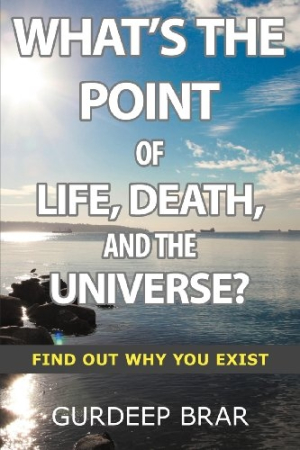What's the Point of Life, Death and the Universe?
“Personally, I do not believe that awareness, self-discovery, and spirituality can be taught. They already exist within you, so they can only be inspired or awoken, writes,” Gurdeep Brar in What’s the Point of Life, Death and the Universe? With her new self-help book, the author—a Reiki master, motivational speaker, and life coach—tackles spirituality and the inner life as a means to personal transformation.
Brar calls religion “the elephant in the room,” suggesting that the practice of religion can get in the way of the experience of spirituality. She urges readers to get in touch with their souls. She shares many of her beliefs: the soul is an entity far larger than the body, so it cannot be contained within the body; the soul is always conscious, always reaching out to communicate with other souls; angels can be accessed for assistance in our daily lives; and a universal law of cause and effect (karma) determines consequences. She believes that people can summon a “white (divine) light” for protection against negative influences. Death, she believes, is more like a graduation than an ending, and she treats reincarnation as a logical fact.
Brar’s book is well organized, each chapter taking on some aspect of an inner life of revelation and guidance—the journey of the soul. Each chapter ends with a series of questions that highlight the material covered, much like a textbook (but not a boring one!). Brar writes in comprehensible expository prose, without embellishment. Neither simplistic nor overly intellectual (she does cite some scientific basis for spiritual beliefs), her book could be read with equal interest by serious spiritual seekers and those new to the subject. The illustrative stories are simple, personal, and brief, mainly stressing the many ways that readers can use spiritual knowledge for practical living.
The book’s title is intriguing and, some would say, arrogant. How can one person know the “point of life, death and the universe”? Brar simply states, “one day I had an epiphany,” declaring that the ideas in the book “came from within me.” She presents some absolutes (“most people in the world agree” that there is one God and life begins when a baby takes its first breath) that could alienate some readers, but her bold statements arise from conviction and will resonate with many readers.
Brar doesn’t pretend to be a guru, but she does hope that her book will be a signpost for others. The tenets she promotes are a happy, harmless mélange of ideas for inner transformation, including attracting abundance, avoiding bad vibrations, summoning one’s inner resources, and looking beyond the physical world for answers to one’s problems.
The final product is a pleasant, well-arranged, informative guide to spiritual living.
Reviewed by
Barbara Bamberger Scott
Disclosure: This article is not an endorsement, but a review. The publisher of this book provided free copies of the book and paid a small fee to have their book reviewed by a professional reviewer. Foreword Reviews and Clarion Reviews make no guarantee that the publisher will receive a positive review. Foreword Magazine, Inc. is disclosing this in accordance with the Federal Trade Commission’s 16 CFR, Part 255.

